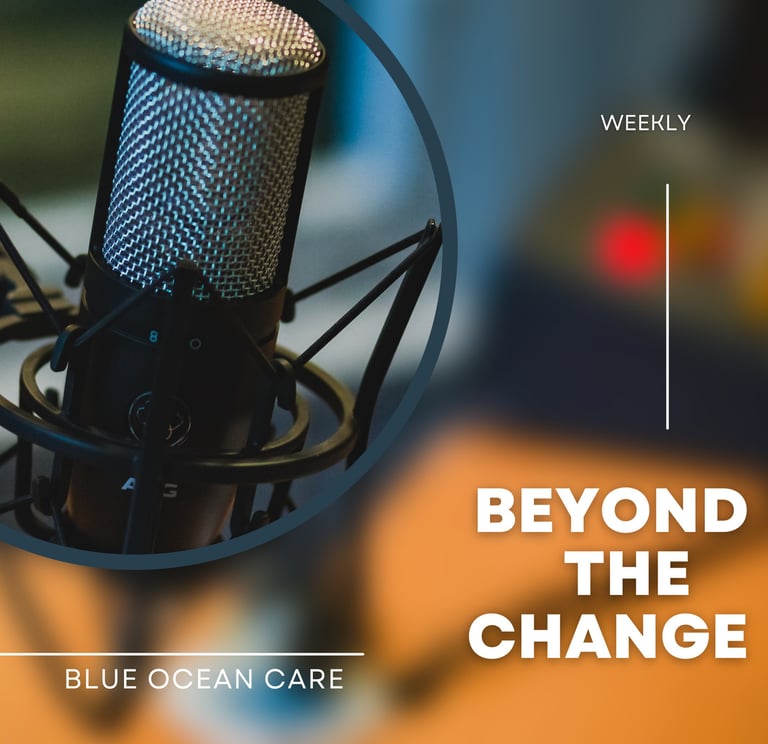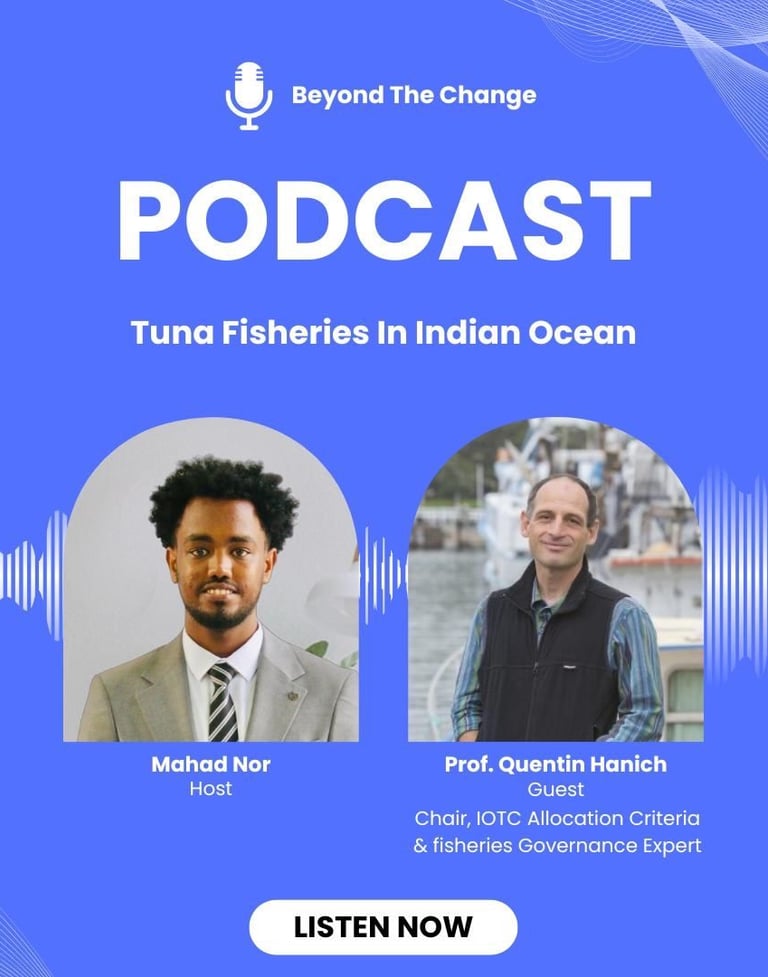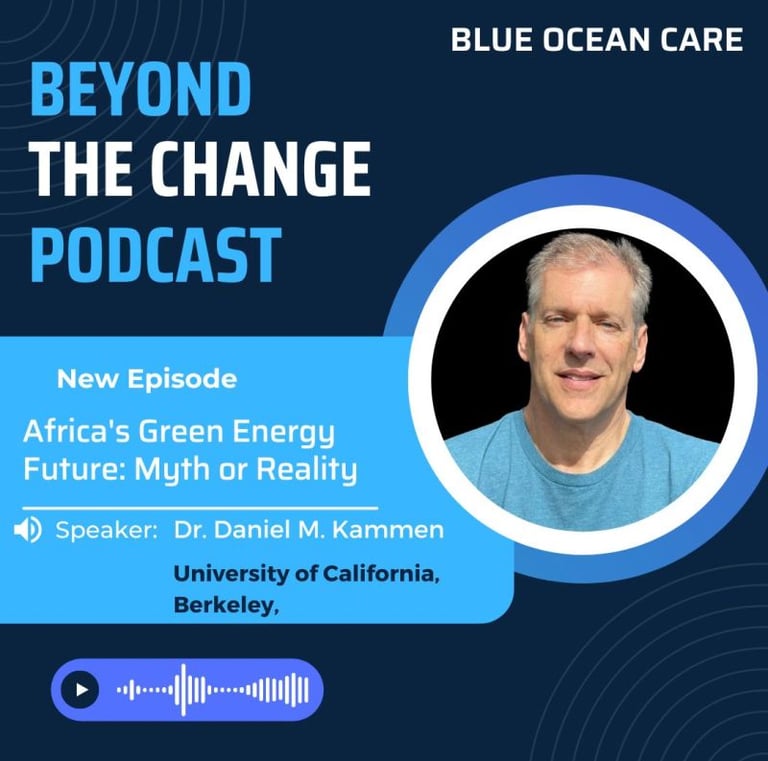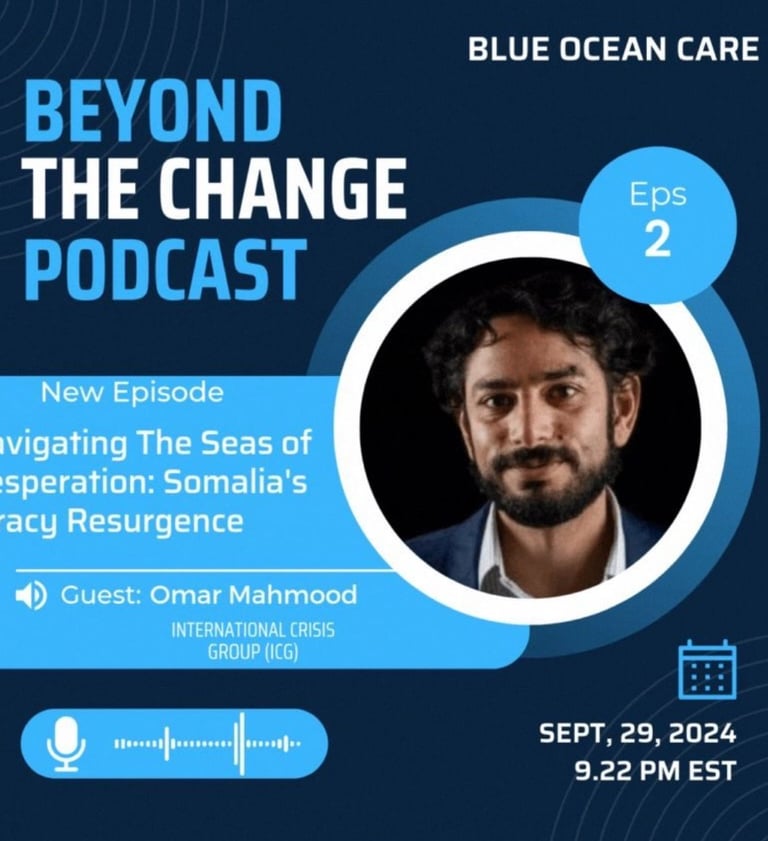BEYOND THE CHANGE PODCAST
Connects you with the visionary leaders pioneering radical innovation & Sustainability


Episode 03: Tuna Fisheries In Indian Ocean
we sit with Professor Quentin Hanich, to discuss his role in the Indian Ocean Tuna Commission (IOTC) negotiations and what those talks mean for people on the water. Tuna is more than a commodity — it’s a source of food, income, and international tension. We unpack the scientific, political and economic layers that shape tuna management across coastal states and the high seas: stock assessments and uncertainty, the influence of distant-water fishing fleets, illegal, unreported and unregulated (IUU) fishing, regional governance challenges, and downstream value chains that rarely reward coastal fishers fairly.
Expect a conversation that moves from technical negotiation rooms to the beaches and markets where coastal communities live with the decisions made far offshore. We ask: who benefits from tuna, who loses, and how can policy, surveillance, and local empowerment create a fairer, more sustainable tuna economy in the Indian Ocean
Guest: Professor Quentin Hanich — invited to discuss his role in IOTC negotiations and tuna governance.
Key topics:
How the IOTC works and why regional negotiations matter for fishers.
Scientific assessments, stock uncertainty, and precautionary management.
Distant-water fleets vs. artisanal coastal fishers — access, licenses, and conflict.
IUU fishing: impacts, detection, and enforcement gaps.
Economic value chains: who captures profit (exporters, processors, middlemen).
Options for community empowerment: co-management, monitoring, and benefit sharing.
Policy recommendations: strengthening regional cooperation, transparency in licensing, and investing in coastal value addition.
Why it matters: Tuna policy shapes food security, jobs, and regional stability across the Indian Ocean rim.
Further resources: IOTC reports, national fisheries strategies, and local case studies.




Episode 02: Africa's Green Energy Future: Myth or Reality
On this episode of Beyond The Change we spoke with Dr. Daniel M. Kammen, Director of the Renewable and Appropriate Energy Laboratory (RAEL) at UC Berkeley, about whether Africa’s clean-energy promise is realistic — and how it can be made just.
Using hard numbers and long-term research, we discuss why Africa’s future matters to the world: the continent is home to roughly 1.5 billion people today and could reach ~2.5 billion by 2050, yet only about 43% currently have access to electricity. Dr. Kammen draws on his work across major projects (from the Kenya–Ethiopia green corridor to Morocco’s energy transition) and his co-authored paper “The African Fulcrum to Bend the Curve of the Climate Crisis to a Just Transition” to unpack:
Realistic timelines for scaling solar, wind, storage, and transmission.
Differences between centralized grids and off-grid/mini-grid solutions for energy access.
Four future emissions scenarios (low / mid / high / green-growth) and why green-growth matters.
Methodologies for estimating future emissions and policy implications.
The meaning and mechanics of a just transition: who benefits, who’s left behind, and how to design fair finance.
Practical suggestions for governments, funders, and communities to keep Africa on a sustainable path.
This episode blends big-picture climate questions with grounded, technical insight — essential listening for policymakers, energy practitioners, and anyone invested in an equitable energy future for Africa.
Show notes
Guest: Dr. Daniel M. Kammen — Professor, Energy & Resources Group; Director, RAEL, UC Berkeley.
Research & examples referenced: Kenya–Ethiopia green corridor, Morocco’s green transformation, and the paper “The African Fulcrum to Bend the Curve of the Climate Crisis to a Just Transition.”
Further reading:
Dr Danial kammen profile : https://kammen.berkeley.edu
Research paper: https://iopscience.iop.org/article/10.1088/2515-7620/ad61c3


Episode 01: Navigating The Seas of Desperation: Somalia's Piracy Resurgence
This week on Beyond The Change, we welcome with Omar Mahmood from the International Crisis Group about the worrying return of piracy off Somalia’s coast. Omar joins us after reporting on the ground in Eyl, Puntland, Somalia. He takes us beyond headlines to explore why piracy is re-emerging: the pressures on local fishermen, rising frustration at foreign trawlers, failures of governance, and how shifting loyalties in coastal communities are reshaping security and livelihoods.
We unpack how geopolitics, economic marginalization, and local grievance intersect to create fertile ground for criminal networks — and why many coastal people feel caught between condemning violence and cheering isolated acts of retribution. A crucial conversation for anyone trying to understand the human story behind maritime crime.
show notes
Guest: Omar Mahmood — Senior Analyst, International Crisis Group
What Omar saw in Eyl and why locals feel their livelihoods are under threat.
How local grievance and weak maritime governance create openings for criminal networks.
The difference between condemning piracy as crime and celebrating isolated acts of retribution.
Practical measures that could reduce incentives for piracy and rebuild coastal resilience.
Soundbite: “We actually hate the pirates, but when we see them destroying a foreign ship, we celebrate…”
Links


